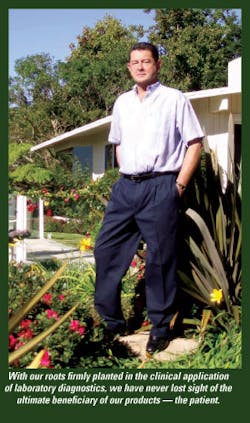Dick Rowland
Professional
Currently CEO The Binding Site Inc.
Joined The Binding Site in November 1987.
Prior positions with Biotest and Bayer.
Education
BSc and PhD,
both in cell biology and immunology,
University College-London.
Personal
Enjoys travel, swimming, snorkeling,
and underwater photography.
Our history.
At Binding Site, we constantly strive to improve the tools available to
laboratory professionals around the world for diagnosing and monitoring
disease. Our origins date back to a group of researchers within the
U.K.'s Medical School of Birmingham University who first started looking
at innovative ways of producing antibodies in the early 1970s. With a
desire to continue this early work — but lacking the required government
funding — they founded a private company to take the research forward
and utilize any potential commercial benefits. That company has evolved
into Binding Site with hundreds of FDA-cleared diagnostic products,
subsidiaries in the United States, Germany, France, and Spain, and a
distributor network in 62 other countries. With our roots firmly planted
in the clinical application of laboratory diagnostics, we have never
lost sight of the ultimate beneficiary of our products — the patient.
Our solutions. In 2001, Binding Site launched Freelite
serum-free light-chain assays as an aid in the diagnosis and monitoring
of multiple myeloma. Unlike current electrophoretic assays, Freelite is
fully quantitative, automated, and more sensitive. Binding Site hired
technical directors (all MDs or PhDs) whose sole responsibility is to
educate physicians on the clinical utility and benefits of Freelite; 10
of these are based in North America. In order to help labs using
Freelite assays, we recently introduced the SPAplus — a bench-top
turbidimetric analyzer with autodilution capability and high throughput.
Our collaborations.The Binding Site collaborates with many of the top myeloma centers
around the world, assisting with kits and personnel to perform research
into new applications for Freelite assays. To further this
collaboration, Binding Site sponsored the 5th International Symposium on
Clinical Applications of Serum-Free Light Analysis in the United Kingdom
in September 2008. One presentation on behalf of the International
Myeloma Working Group reported guidelines that recommend the use of
serum-free light-chain assays in the initial evaluation of suspected
myeloma. We anticipate further global collaboration following the launch
of Hevylite — our new assays for quantitation and typing of intact
myeloma paraproteins in early 2009. Freelite's importance was recognized
when Binding Site won the U.K.'s 2007 Queen's Award for Innovation.
Global impact.Binding Site is also active in the fields of autoimmune and infectious
diseases, with a wide range of assays across different technologies.
Recognizing the global demand for automation for these tests, Binding
Site introduced the DSX four-plate ELISA processor in 2001 in the United
States, along with its ASP1200 IFA instrumentation in Europe. This has
allowed labs worldwide to automate a large part of their
autoimmune-/infectious-disease testing. In the last year, we also
introduced the ESP600, a new six-plate four-probe high-throughput ELISA
processor suited to labs with high workloads. Our philosophy behind
these instruments is that they be truly “open systems.” Binding Site
applications specialists program not only our assays on the systems but
also other manufacturers' assays. Our customers appreciate this
flexibility in comparison to “closed systems.”
Rooted in education.Binding
Site retains very close ties with the Birmingham University, and
regularly recruits both BSc and PhD graduates onto its R&D team. In
fact, one research fellow from the school who was hired more than 14
years ago is now on our board of directors. We have a formal program to
sponsor positions for graduate students during their year out for work
experience and actively encourage them to return for full-time
employment following graduation. Binding Site also sponsors bachelor's
and master's degrees for its full-time employees. In the United States,
our in-house team of technical-service specialists and our in-field
application specialists are recruited from both the biological sciences
and the medical-laboratory community.


